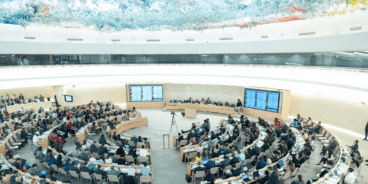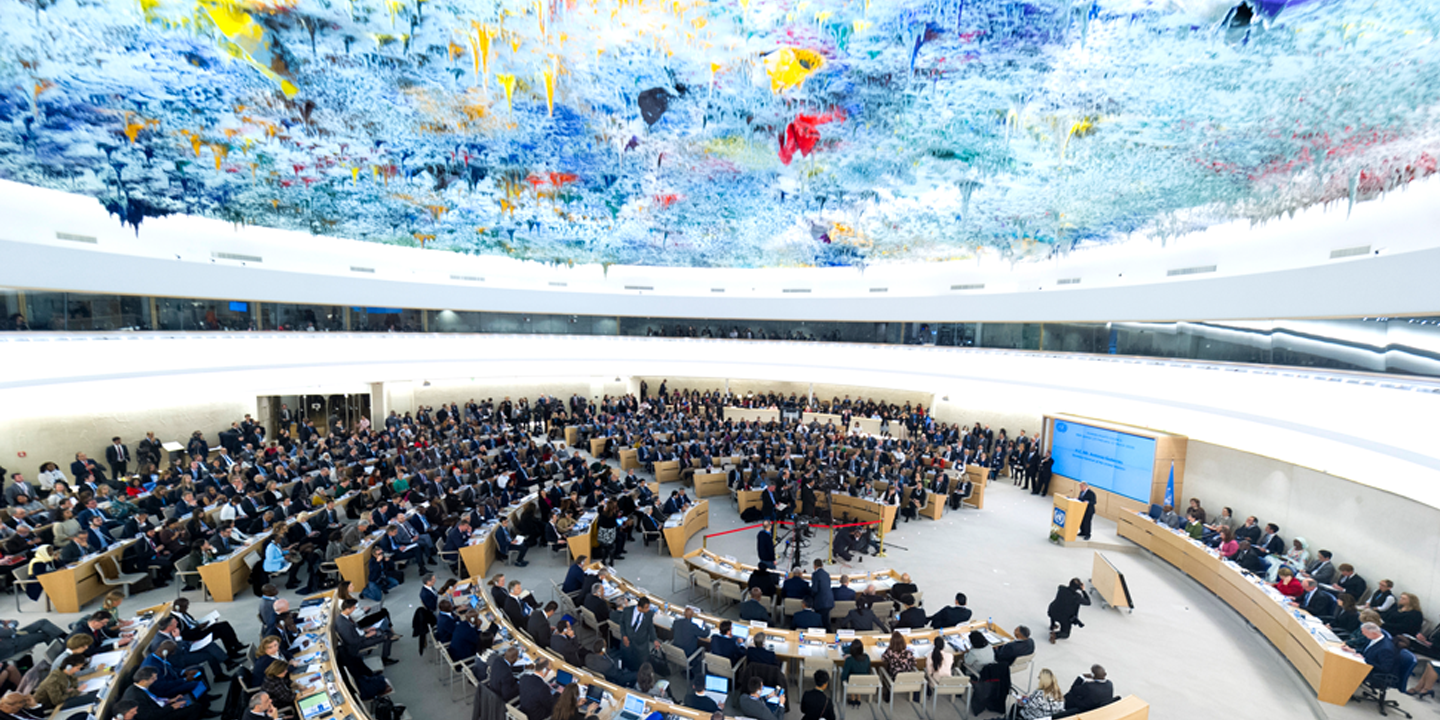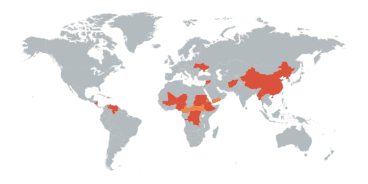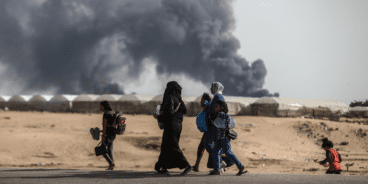

International Accountability Critical to Achieving Justice for Victims and Promoting Lasting Peace in Yemen
This letter is available in both English and Arabic (below).
As civil society organizations from Yemen and around the world we urge United Nations (UN) member states to work toward the establishment of an independent international criminally focused investigative mechanism on Yemen in the coming period, including at the upcoming 51st Session of the UN Human Rights Council (HRC).
While a Yemen truce hangs in the balance, little to no progress has been made by parties to the conflict to address ongoing and widespread violations and abuses of international human rights and humanitarian law or remedy the harms they have inflicted on civilians throughout the conflict. The humanitarian situation in Yemen remains desperate, and, in recent weeks, armed clashes have once again increased. Civilians continue to fall victim to shelling, drone strikes and other attacks. These factors attest to the urgent and critical need to reinvigorate international accountability efforts on Yemen through the establishment of an independent international investigation.
As highlighted by the UN High Commissioner for Human Rights, “We know that lasting peace is interlinked with justice, development and respect for human rights.” Unfortunately, justice, truth and reparation for human rights abuses were overlooked by the international community after mass pro-democracy protests in Yemen toppled the government of the former President Ali Abdullah Saleh in 2011. Between 2011-2014, the Gulf Cooperation Council’s (GCC) political initiative for Yemen, as endorsed by the UN Security Council, prioritized implementing a quick transition of power at the expense of ensuring accountability, establishing the rule of law and addressing the government’s long record of human rights violations. The immunity afforded to former President Saleh and others only entrenched a culture of impunity that likely played a key role in the renewal of armed conflict and the commission of widespread human rights abuses and war crimes within the country. Almost ten years later the international community is in danger of repeating the same mistake.
For years Saudi Arabia, the United Arab Emirates (UAE), the Internationally Recognized Government of Yemen, the Ansar Allah (Houthi) armed group, and other warring parties have caused, and continue to cause, massive civilian harm and suffering in Yemen, carry out frequent and serious violations of international human rights and humanitarian law, and have failed to conduct credible investigations, provide reparations, or ensure justice for victims. In the last month, attacks against civilians and other related violence have resulted in 232 civilian casualties including 57 children. The last week of July witnessed the highest increase of child casualties in one week since early 2020.
Before its untimely dissolution in 2021, the UN Group of Eminent Experts (GEE), established by the UN Human Rights Council (HRC) in 2017, recommended that UN member states refer the situation in Yemen to the International Criminal Court (ICC), support the establishment of a criminal-accountability-focused investigative mechanism, and stressed the need to realize victims’ right to reparation. In late 2021, HRC members narrowly rejected the resolution that would have renewed the GEE’s mandate after Saudi Arabia, backed by the UAE, lobbied HRC members to vote against its renewal.
The international community should not stand by and allow that vote to be the last word on accountability efforts for large scale human rights abuses and war crimes in Yemen. After its mandate ended in October 2021, members of the GEE called on the international community to take specific initiatives at the international level in pursuit of accountability. Dozens of UN Member States have recognized an “urgent need for independent and impartial monitoring and investigations” and urged the international community to “actively explore further alternative mechanisms…to ensure accountability” for crimes committed in Yemen. As the GEE stated, “Victims of this tragic armed conflict should not be silenced by the decision of a few States. Quite the opposite, they should be supported by all means to see the realisation of their rights to truth, justice and reparation.”
The international community must not repeat the mistakes of the past and side-line international accountability efforts now. Continued impunity will only increase the likelihood that more children will starve, more rights defenders and journalists will be imprisoned or executed, more homes and schools will be bombed, and the cycle of violence and suffering will continue.
In this context, an international independent criminal accountability mechanism for Yemen can play a critical role to deter violence, protect civilians and promote a genuine and lasting peace. In December 2021, nearly 90 civil society organizations called on member states of the UN to move quickly and establish such a mechanism in order to investigate and publicly report on the most serious violations and abuses of international law committed in Yemen. Such a body should collect and preserve evidence, prepare files for possible future criminal prosecutions, and identify victims and document harms for possible future reparation claims. Such a mandate is required to ensure not only that the serious crimes under international law committed in Yemen are exposed to the world, but also that potential avenues of criminal accountability and reparative justice are effectively explored and may be pursued now and, in the future, to address impunity and provide effective redress to victims. Any mechanism that fails to meet these standards would do great disservice to the millions of Yemenis who have suffered grave abuses or apparent war crimes and who still expect justice.
We call on your government to work to ensure the establishment of such a mechanism at the UN in the coming period, including at the upcoming UN Human Rights Council, and stand ready to assist with these efforts in any way we can.
بصفتنا منظمات مجتمع مدني يمنية وإقليمية ودولية، ندعو الدول الأعضاء في الأمم المتحدة إلى العمل على تشكيل ألية تحقيق جنائية دولية مستقلة بشأن اليمن، خلال الجلسة الـ 51 لمجلس حقوق الإنسان بالأمم المتحدة والمقرر انعقادها خلال الشهر الجاري. وتؤكد منظماتنا أن الهدنة اليمنية لا تزال ضعيفة؛ إذ لا يزال الوضع الإنساني في اليمن بائسًا، كما أن أطراف النزاع لم تحرز سوى تقدم ضئيل للغاية، يكاد لا يذكر، بشأن التصدي للانتهاكات والتجاوزات المتواصلة واسعة النطاق للقانون الدولي لحقوق الإنسان والقانون الدولي الإنساني. كما يبدو واضحًا افتقارها للنية في جبر الأضرار التي ألحقتها بالمدنيين طوال فترة النزاع. في الوقت نفسه، شهدت اليمن، أثناء الأسابيع الأخيرة، تجدد الاشتباكات المسلحة، مما أسفر عن سقوط ضحايا من المدنيين جراء القصف والغارات، التي تشنها الطائرات بلا طيار وغيرها من الهجمات. كل هذه العوامل تعكس الحاجة الملحة والحاسمة لتفعيل جهود المساءلة الدولية بشأن اليمن، وإجراء تحقيق دولي مستقل بشأن الجرائم المرتكبة فيها.
كانت مفوضة الأمم المتحدة السامية لحقوق الإنسان قد أكدت أن «السلام الدائم مرتبط بالعدالة والتنمية واحترام حقوق الإنسان»، إلا أن المجتمع الدولي غفل تحقيق مبادئ العدالة والحقيقة والتعويض عن انتهاكات حقوق الإنسان في اليمن المتصاعدة منذ إطاحة الاحتجاجات الجماهيرية المؤيدة للديمقراطية بحكومة الرئيس السابق علي عبد الله صالح في عام 2011. وعلى مدار الفترة بين عامي 2011 و2014، منحت مبادرة مجلس التعاون الخليجي لليمن، على النحو الذي أقره مجلس الأمن بالأمم المتحدة، الأولوية لتنفيذ انتقال سريع للسلطة بدلًا من ضمان المساءلة وإرساء سيادة القانون ومعالجة السجل الحكومي الطويل لانتهاكات حقوق الإنسان. كما ساهمت الحصانة الممنوحة للرئيس السابق وأخرين في ترسيخ ثقافة الإفلات من العقاب، الأمر الذي تسبب بشكل رئيسي في تجدد النزاع المسلح وارتكاب انتهاكات واسعة النطاق لحقوق الإنسان وجرائم حرب داخل البلد. ورغم مرور 10 سنوات تقريبًا، يبدو أن المجتمع الدولي في طريقه لتكرار الخطأ نفسه.
ومنذ 2014، تسببت الأطراف المختلفة للنزاع، بما في ذلك المملكة العربية السعودية والإمارات العربية المتحدة والحكومة اليمنية المعترف بها دوليًا وجماعة أنصار الله المسلحة (الحوثيين)، في ضرر ومعاناة كبيرة للمدنيين في اليمن، ولا تزال هذه الأطراف ترتكب انتهاكات وتجاوزات متصاعدة وخطيرة للقانون الدولي لحقوق الإنسان والقانون الإنساني الدولي.[i]1 في الوقت نفسه، فشلت جميع هذه الأطراف في إجراء تحقيقات جدية وفعالة، أو تقديم تعويضات، أو ضمان العدالة للضحايا. فعلى سبيل المثال، في الشهر الماضي، أسفرت الهجمات بحق المدنيين عن وقوع 232 ضحية، من بينهم 57 طفلًا. كما شهد الأسبوع الأخير من يوليو أعلى زيادة في إصابات الأطفال في أسبوع واحد منذ 2020.
كان فريق خبراء الأمم المتحدة البارزون المعني باليمن، قد أوصى قبل حله المفاجئ في عام 2021، بأن تحيل الأمم المتحدة الوضع في اليمن إلى المحكمة الجنائية الدولية، مشددًا على أهمية تشكيل آلية تحقيق دولية تركز على المساءلة الجنائية. كما أكد الفريق على الحاجة إلى إعمال حق الضحايا في التعويض. ويُذكر أنه في أواخر عام 2021، رفض أعضاء مجلس حقوق الإنسان قرار تجديد ولاية فريق الخبراء البارزين بالأمم المتحدة بشأن اليمن؛ بعدما مارست المملكة العربية السعودية، بدعم من الإمارات، ضغوطًا على أعضاء مجلس حقوق الإنسان للتصويت ضد قرار التجديد.
في هذا السياق، تطالب منظماتنا المجتمع الدولي بألا يكتفي بالوقوف مكتوف الأيدي، وألا يسمح لهذا التصويت بأن يكون الكلمة الأخيرة بشأن جهود المساءلة الدولية عن انتهاكات حقوق الإنسان وجرائم الحرب واسعة النطاق في اليمن. ونتفق مع دعوة فريق الخبراء البارزين، في أكتوبر 2021، للمجتمع الدولي باتخاذ مبادرات محددة على المستوى الدولي سعيًا للمساءلة. كما نؤكد على موقف عشرات الدول الأعضاء بالأمم المتحدة بشأن «الحاجة الملحة للرصد وإجراء تحقيقات مستقلة ونزيهة»، ومطالبتها بـ«استكشاف المزيد من الآليات البديلة بنشاط…لضمان المساءلة» عن الجرائم المرتكبة في اليمن. وحسبما صرح فريق الخبراء، فإنه «لا ينبغي إسكات ضحايا هذا الصراع المسلح المأساوي بقرار من بضع دول. على العكس، ينبغي دعمهم بكل الوسائل حتى يتمكنوا من معرفة الحقيقة والوصول للعدالة والتعويض».
إن منظماتنا تدعو المجتمع الدولي لعدم تكرار أخطاء الماضي، ومن ثم تعزيز جهود المساءلة الدولية .ونؤكد في الوقت ذاته أن استمرار الإفلات من العقاب لن يؤدي إلا لاستمرار دورة العنف والمعاناة، بما في ذلك تصاعد احتمال تجويع المزيد من الأطفال، وسجن أو إعدام المزيد من المدافعين عن الحقوق والصحفيين، وقصف المزيد من المنازل والمدارس.
في هذا السياق، بإمكان آلية دولية مستقلة للمساءلة الجنائية لليمن الاضطلاع بدور حاسم في ردع العنف وحماية المدنيين وتعزيز سلام حقيقي ودائم.
في ديسمبر 2021، دعا قرابة 90 منظمة مجتمع مدني الدول الأعضاء بالأمم المتحدة إلى التحرك بسرعة وتشكيل مثل هذه الآلية للتحقيق والإبلاغ علنًا عن انتهاكات وتجاوزات القانون الدولي المرتكبة في اليمن. ينبغي لمثل هذه الآلية أن تعمل على جمع الأدلة وحفظها، إلى جانب إعداد ملفات للملاحقات الجنائية المحتملة في المستقبل، وأن تضع القواعد والأسس لإنصاف فعال بما يتضمن تحديد الضحايا، وتوثيق الأضرار لدعم أي مطالبات بالجبر في المستقبل. ونؤكد على أن مثل هذا التفويض القوي مطلوب؛ ليس فقط من أجل فضح الجرائم الخطيرة المرتكبة في اليمن، ولكن أيضًا لضمان استخدام هذه الوثائق في مساءلة جنائية فعالة في المستقبل للتصدي للإفلات من العقاب وتوفير الإنصاف الفعال للضحايا. ونؤكد في الوقت نفسه أن أية آلية لا تفي بهذه المعايير من شأنها الإضرار بشكل بالغ بملايين اليمنيين الذين عانوا من تجاوزات خطيرة أو من جرائم حرب واضحة وما زالوا يتطلعون للعدالة.
ندعو حكومتكم إلى العمل على ضمان تشكيل مثل هذه الآلية الأممية في الفترة المقبلة، بما في ذلك خلال الجلسة القادمة لمجلس حقوق الإنسان بالأمم المتحدة، ونؤكد استعدادنا للمساعدة في إنجاح هذه الجهود بكافة الطرق الممكنة.
Signatories/قائمة الموقعين
- Abductees’ Mothers Association
- Abs Development Organization for Women & Child
- Acción Solidaria on HIV/Aids
- Action on Armed Violence
- Alkarama for Human Rights
- ALQST for Human Rights
- Amnesty International
- Bridges for Yemen
- Cairo Institute for Human Rights Studies (CIHRS)
- Campaign Against Arms Trade
- INSAF Center for Defending Freedoms & Minorities
- CIVICUS: World Alliance for Citizen Participation
- CIVILIS Human Rights
- Columbia Law School Human Rights Institute
- Defence for Children International
- DefendDefenders (East and Horn of Africa Human Rights Defenders Project)
- Defence Foundation for Rights and Freedoms
- Democracy School
- Foundation (my Right) to empower women politically and socially
- Friends Committee on National Legislation (FCNL)
- Global Centre for the Responsibility to Protect (GCR2P)
- Gulf Centre for Human Rights (GCHR)
- Hearts On Venezuela
- Human Life Foundation for Development and Relief
- Human Rights Information and Training Center (HRITC)
- Human Rights Watch (HRW)
- International Commission of Jurists (ICJ)
- International Federation for Human Rights (FIDH)
- International Service for Human Rights (ISHR)
- Min Haqqi Foundation to Empower Women Politically and Economically
- Musaala Organization for Human Rights
- Mwatana for Human Rights
- PAX
- Project on Middle East Democracy (POMED)
- Salam For Yemen
- SAM for Rights and Liberties
- She4Society Initiative
- Studies and Economic Media Center (SEMC)
- The Yemeni Archive
- Vision GRAM-International
- Vredesactie
- Wa3ifoundation
- Watch for Human Rights
- Women Defenders for Rights and Freedoms Foundation
- Yemen Future Foundation for Culture and Media Development
- Yemen Peace School Organization
- Yemen Relief and Reconstruction Foundation
- Yemen Women Union
- Yemeni Media Freedom Observatory (YMFO)
Related Content


